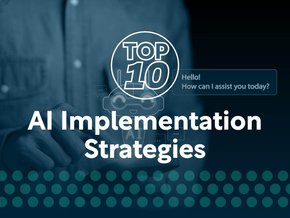Top 10 no-code tools revolutionising the world of AI

In today's rapidly evolving technological landscape, AI has emerged as a game-changer, transforming industries and empowering businesses to optimise their operations. However, integrating AI into existing workflows has often been a complex and resource-intensive endeavour, requiring specialised technical skills. That is, until the advent of no-code AI tools.
No-code AI tools have revolutionised the AI landscape, democratising access to its power by enabling non-technical users to build, deploy, and automate AI models without writing a single line of code. With their user-friendly interfaces and intuitive drag-and-drop functionalities, these tools have unlocked limitless possibilities for businesses and individuals alike.
10: PyCaret
PyCaret is an open-source, low-code machine learning library in Python that automates machine learning workflows. It is an end-to-end machine learning and model management tool that speeds up the experiment cycle exponentially and makes you more productive.
In comparison with the other open-source machine learning libraries, PyCaret is an alternate low-code library that can be used to replace hundreds of lines of code with few lines only. This makes experiments exponentially fast and efficient.
9: DataRobot
DataRobot is the leader in Value-Driven AI – a unique and collaborative approach to AI that combines its open AI platform, deep AI expertise, and broad use-case implementation to improve how customers run, grow, and optimise their business.
DataRobot’s platform is designed to simplify and automate the complex tasks involved in developing AI solutions, making it accessible to both data scientists and business professionals without extensive coding knowledge.
8: Obviously AI
Obviously AI has built a tool that enables non-technical business analysts to rapidly run predictions on their historical data, with just a few clicks, allowing them to make better business decisions, fast.
With Obviously AI, users can easily connect their data sources, such as spreadsheets or databases, and utilise the platform's automated machine learning capabilities to train and deploy predictive models. The platform automates the entire model-building process, including data preprocessing, feature selection, algorithm selection, and hyperparameter tuning. This allows users to quickly generate accurate predictions and actionable insights without the need for manual intervention.
7: RunwayML
Runway is an applied AI research company shaping the next era of art, entertainment and human creativity.
With RunwayML, users can easily train and deploy AI models without requiring extensive coding knowledge. The platform supports a wide range of AI applications, including image synthesis, style transfer, natural language processing, object detection, and more. Users can upload their data or choose from a library of pre-existing models to generate AI-driven outputs.
6: Google Teachable Machine
Google Teachable Machine is a web-based tool developed by Google that allows users to create machine learning models without the need for coding or complex algorithms. It provides a user-friendly interface that enables individuals to train their own models using their own data.
With Google Teachable Machine, users can easily train models for tasks such as image classification, sound classification, and pose estimation. The tool utilises a technique called transfer learning, which leverages pre-trained deep learning models and allows users to retrain them on their specific data.
5: Microsoft Lobe
Developed by Microsoft, Lobe helps people with no data science experience import images and easily label them to create a machine learning dataset. Lobe automatically selects the right machine learning architecture and starts training without any setup or configuration. Users can evaluate the model’s strengths and weaknesses with real-time visual results, play with the model and offer feedback to boost performance.
4: Apple CreateML
Apple Create ML is a machine learning framework and toolset developed by Apple Inc. It is specifically designed for macOS and iOS platforms, enabling developers to build and train custom machine learning models with ease.
Create ML provides a user-friendly interface and a set of APIs that simplify the process of training and deploying machine learning models on Apple devices
Create ML is designed to empower developers to create and deploy machine learning models that are tailored to their specific needs, taking advantage of Apple's hardware and software ecosystem. It provides a user-friendly approach to machine learning development, enabling developers to bring machine learning capabilities to their apps and services on Apple platforms.
3: Akkio
Founded in 2019, Akkio is a technology company whose mission is to make artificial intelligence easy enough for anyone to use. Its no-code machine learning platform helps modern sales, marketing, and finance teams create and deploy AI predictive models.
By combining state-of-the-art ML technology with a streamlined, intuitive cloud platform, Akkio empowers businesses to embrace all the benefits of AI without requiring data scientists or complex coding.
2: Google AutoML
AutoML enables developers with limited machine learning expertise to train high-quality models specific to their business needs. Build your own custom machine learning model in minutes.
Google AutoML is a suite of machine learning tools and services provided by Google Cloud that aims to simplify the process of building and deploying custom machine learning models. AutoML offers a range of products and features that cater to different aspects of the machine learning workflow.
1: Amazon SageMaker
Launched in 2017, Amazon SageMaker is a cloud ML platform that enables developers to create, train, and deploy machine-learning models in the cloud. It also enables developers to deploy ML models on embedded systems and edge devices.
SageMaker is built on Amazon’s two decades of experience developing real-world ML applications, including product recommendations, personalisation, intelligent shopping, robotics, and voice-assisted devices.
Amazon SageMaker aims to simplify and accelerate the process of building and deploying machine learning models, making it more accessible to developers and data scientists who may not have specialised expertise in managing the underlying infrastructure.






